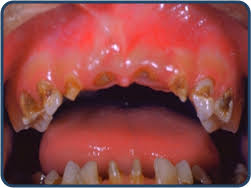
Children fed with processed foods risk poor dentition – Research
According to new research, children who eat foods that are more artificial than natural—known as ultra-processed meals—are more likely to develop buck teeth, a disease where the upper teeth protrude because the jaws do not align.
Foods high in additives have been related in the past to an increased risk of cancer, heart disease, and type 2 diabetes.
Eating processed foods raises the risk of cancer and heart failure.
Additionally, Nigerians are advised by nutritionists to limit their consumption of processed foods, sugar, salt, and fat.
According to the World Health Organisation, eating too much sugar has a detrimental effect on one's health, raises the risk of illnesses, high blood pressure, heart disease, tooth damage, and dental cavities. It also causes unhealthful weight gain.
Experts have consistently advocated for diets to be drastically reduced in ultra-processed foods and foods with a higher proportion of artificial chemicals than natural ones.
After following scores of young toddlers, the Spanish scientists found that eating a diet high in UPFs—which are usually soft and extremely palatable—had an effect on the development of the jaw.
Chewing is essential for the healthy development of the jaws because it stimulates bone growth, develops facial muscles, and supports good dental alignment, according to Dr. Laura Martinez, a paediatric dentist at the Catholic University of Valencia in Spain and one of the study's authors.
Malocclusion (tooth misalignment) and inadequacies in the size and shape of dental arches can be avoided by exercising the jaw when chewing solid and fibrous meals like fruits, vegetables, or natural proteins.
However, diets high in ultra-processed foods, which are soft and require little chewing effort, have a detrimental effect on the development of the jaw.
"These foods can result in underdeveloped bone structures and raise the risk of malocclusion and respiratory issues by not sufficiently stimulating the maxillofacial muscles and bones," she said.
In a another study, researchers from the United States of America monitored more than 600 obese Americans and found that those who consumed more junk food had more fat accumulated in their thigh muscles.
British toddlers ate half of their calories from ultra-processed foods, according to research done in the UK. The study also found that UPFs were ingested by 59% of seven-year-olds.
Martinez et al.'s study examined the feeding patterns, dental anatomy, and skull shape of 25 children aged three to five.
Buck teeth and a lack of natural gaps between teeth—which are necessary in early childhood to accommodate larger teeth later on—were more common in individuals who consumed softer foods, according to the study.
Although jaw shrinkage in youngsters has increased, it has increased over the past 20 years, according to Professor Tim Spector, a food specialist from the United Kingdom, who spoke to The Telegraph.
He continued by saying that children's dental issues have increased as a result, with many now wearing braces and having misaligned teeth.
Although jaw shrinkage has been a problem for a few hundred years, it has significantly increased in the past 20 years.
Consequently, there is a significant increase in orthodontic problems in children – a massive use of braces, and far more crooked teeth,” Spector said.
The report also noted that due to the increasing number of children being fed baby foods, there has been a rise in them having shrinking jaws and strong jaw muscles adapted for chewing.
The umbrella term UPFs is used to cover anything edible made with colourings, sweeteners and preservatives that extend shelf life.
Ready meals, ice cream and tomato ketchup are some of the best-loved examples of products that fall under the umbrella of UPF term, which is now synonymous with foods offering little nutritional value.





